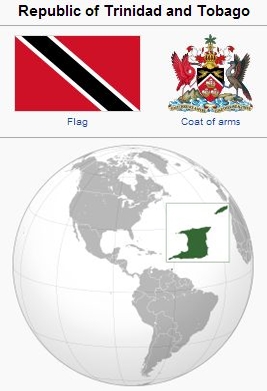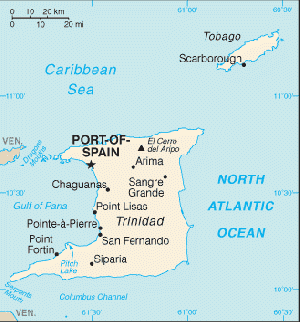Difference between revisions of "Trinidad and Tobago"
| [checked revision] | [checked revision] |
GameoAdmin (talk | contribs) (CSV import - 20130823) |
m |
||
| Line 1: | Line 1: | ||
| − | [[File:Trinidad_map.gif|300px|thumb| | + | __FORCETOC__ |
| + | __TOC__ | ||
| + | [[File:Trinidad_map.gif|300px|thumb|left|''Trinidad & Tobago, 2006<br /> | ||
| + | World factbook map '']] | ||
| + | [[File:Trinidad1.jpg|277px|thumb|right|''Source: [http://en.wikipedia.org/wiki/File:Trinidad_and_Tobago_%28orthographic_projection%29.svg Wikipedia Commons]'']] | ||
| + | Trinidad and Tobago is a lovely tropical Caribbean twin island nation of 5,131 square kilometers (1,981 square miles) just 11 kilometers from Venezuela. Arawak and Carib Indians inhabited these islands when Christopher Columbus landed there in 1498. African and Indian slaves and indentured servants arrived in these British colonies, which became independent in 1962. A Commonwealth-type parliamentary government was retained with elections held every five years. | ||
| − | + | The 1980 census revealed a population of 1,055,800 with 41% African-descent, 41% East Indian-descent, and 16% mixed. The four major religious groups were Roman Catholic (34%), Hindu (25%), Anglican (15%), and Muslim (6%). In 2005, the estimated population was 1,088,600 with 37.6% African-descent, 40% East Indian-descent, and 21% mixed. In terms of religion, 26% were Roman Catholic, 22.5% were Hindu, 8% were Anglican, 6% were Muslim, 3.3% did not state their religion and the rest were divided mainly into other branches of Protestantism. | |
| − | |||
| − | The 1980 census revealed a population of 1,055,800 with 41% African-descent, 41% East Indian-descent, and 16% mixed. The four major religious groups were Roman Catholic (34%), Hindu (25%), Anglican (15%), and Muslim (6%). In 2005, | ||
Trinidad's major trading partner was the [[United States of America|United States]] (petroleum, sugar) in 1986. The nation was moving from a primarily rural orientation toward an urban one, and from an agricultural society toward a technological society. Most agricultural work was still performed with hand labor, however. Primary school education was available to all children, but limited facilities and teachers did not permit all children to go on to secondary school. Part of the University of the West Indies was located in Trinidad. In the 1970s educational and health facilities and services were expanded with funds from the oil boom. | Trinidad's major trading partner was the [[United States of America|United States]] (petroleum, sugar) in 1986. The nation was moving from a primarily rural orientation toward an urban one, and from an agricultural society toward a technological society. Most agricultural work was still performed with hand labor, however. Primary school education was available to all children, but limited facilities and teachers did not permit all children to go on to secondary school. Part of the University of the West Indies was located in Trinidad. In the 1970s educational and health facilities and services were expanded with funds from the oil boom. | ||
| Line 9: | Line 12: | ||
[[Mennonite Church (MC)|Mennonite Church (MC)]] [[Broadcasting, Radio and Television|broadcasting]] and medical work, beginning in 1969, led to the formation of the [[Mennonite Church of Trinidad and Tobago|Mennonite Church of Trinidad and Tobago]]. | [[Mennonite Church (MC)|Mennonite Church (MC)]] [[Broadcasting, Radio and Television|broadcasting]] and medical work, beginning in 1969, led to the formation of the [[Mennonite Church of Trinidad and Tobago|Mennonite Church of Trinidad and Tobago]]. | ||
{{GAMEO_footer|hp=Vol. 5, p. 892|date=1990|a1_last=Keeler|a1_first=Richard F|a2_last= |a2_first= }} | {{GAMEO_footer|hp=Vol. 5, p. 892|date=1990|a1_last=Keeler|a1_first=Richard F|a2_last= |a2_first= }} | ||
| + | [[Category:Countries]] | ||
Revision as of 06:45, 23 May 2014

Trinidad and Tobago is a lovely tropical Caribbean twin island nation of 5,131 square kilometers (1,981 square miles) just 11 kilometers from Venezuela. Arawak and Carib Indians inhabited these islands when Christopher Columbus landed there in 1498. African and Indian slaves and indentured servants arrived in these British colonies, which became independent in 1962. A Commonwealth-type parliamentary government was retained with elections held every five years.
The 1980 census revealed a population of 1,055,800 with 41% African-descent, 41% East Indian-descent, and 16% mixed. The four major religious groups were Roman Catholic (34%), Hindu (25%), Anglican (15%), and Muslim (6%). In 2005, the estimated population was 1,088,600 with 37.6% African-descent, 40% East Indian-descent, and 21% mixed. In terms of religion, 26% were Roman Catholic, 22.5% were Hindu, 8% were Anglican, 6% were Muslim, 3.3% did not state their religion and the rest were divided mainly into other branches of Protestantism.
Trinidad's major trading partner was the United States (petroleum, sugar) in 1986. The nation was moving from a primarily rural orientation toward an urban one, and from an agricultural society toward a technological society. Most agricultural work was still performed with hand labor, however. Primary school education was available to all children, but limited facilities and teachers did not permit all children to go on to secondary school. Part of the University of the West Indies was located in Trinidad. In the 1970s educational and health facilities and services were expanded with funds from the oil boom.
Mennonite Church (MC) broadcasting and medical work, beginning in 1969, led to the formation of the Mennonite Church of Trinidad and Tobago.
| Author(s) | Richard F Keeler |
|---|---|
| Date Published | 1990 |
Cite This Article
MLA style
Keeler, Richard F. "Trinidad and Tobago." Global Anabaptist Mennonite Encyclopedia Online. 1990. Web. 16 Apr 2024. https://gameo.org/index.php?title=Trinidad_and_Tobago&oldid=122324.
APA style
Keeler, Richard F. (1990). Trinidad and Tobago. Global Anabaptist Mennonite Encyclopedia Online. Retrieved 16 April 2024, from https://gameo.org/index.php?title=Trinidad_and_Tobago&oldid=122324.
Adapted by permission of Herald Press, Harrisonburg, Virginia, from Mennonite Encyclopedia, Vol. 5, p. 892. All rights reserved.
©1996-2024 by the Global Anabaptist Mennonite Encyclopedia Online. All rights reserved.

